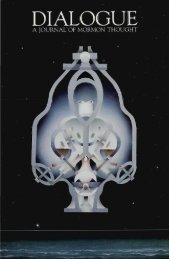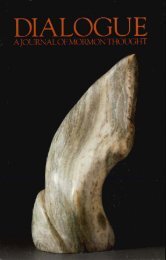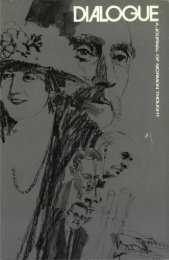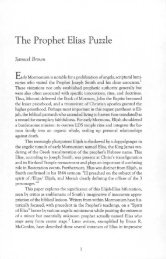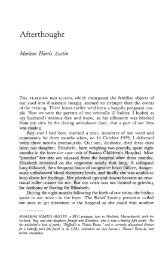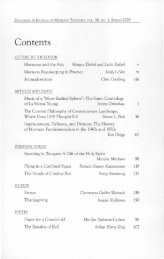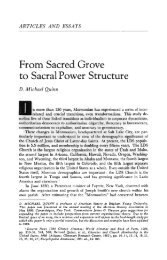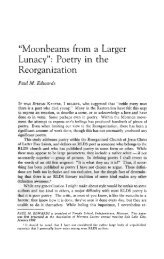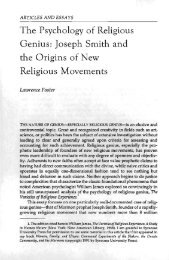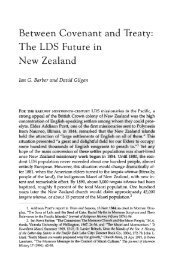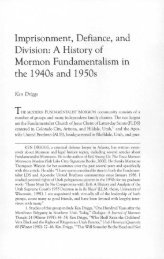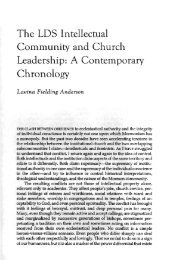Dialogue, Volume 25, Number 2 - Dialogue – A Journal of Mormon ...
Dialogue, Volume 25, Number 2 - Dialogue – A Journal of Mormon ...
Dialogue, Volume 25, Number 2 - Dialogue – A Journal of Mormon ...
You also want an ePaper? Increase the reach of your titles
YUMPU automatically turns print PDFs into web optimized ePapers that Google loves.
20 DIALOGUE: A JOURNAL OF MORMON THOUGHT<br />
something happens in the Arab world that we don't understand, but<br />
no one thinks <strong>of</strong> that as persecution. It is simply an attempt to shed<br />
some light on a perplexing issue. But, somehow, when it's <strong>Mormon</strong>s in<br />
the news, when the Book <strong>of</strong> <strong>Mormon</strong> is involved, we apply a different<br />
standard.<br />
Two years ago, Lou Chandler, a public relations director by pr<strong>of</strong>ession,<br />
who has also served as public communications director in her<br />
stake in Philadelphia and who also happens to be my sister-in-law,<br />
suggested in a Washington, D.C. Sunstone Symposium a more productive<br />
response to institutional criticism. Difficulties occur, she said,<br />
when there is dissonance between what is perceived by a given audience<br />
and the image an institution is trying to project. She explained<br />
that one primary task <strong>of</strong> a public relations department is to assess public<br />
perceptions, determine if those perceptions are in accord with the<br />
image that is desired, and then figure out what to do about changing<br />
those perceptions if they are not. Interestingly, she illustrated her<br />
premise with the rather widely held, but totally erroneous perception<br />
that the <strong>Mormon</strong> Church is, itself, a cult. She had encountered this<br />
perception quite by chance in a private conversation and had spent<br />
some time reading up on cults. Every book she found on the subject<br />
mentioned the Church at least in passing. Many devoted considerable<br />
space to the assertion that the <strong>Mormon</strong> Church is one <strong>of</strong> the major<br />
cults in America.<br />
As she continued her research, she learned that cultologists or whatever<br />
such experts call themselves have more or less agreed upon fourteen<br />
characteristics that generally typify cults, and she spent considerable<br />
time matching up public perceptions <strong>of</strong> the <strong>Mormon</strong> Church with<br />
those characteristics. And she found plenty <strong>of</strong> dissonance. Just one<br />
example: The first five items on the list have to do with control — mind<br />
control, control <strong>of</strong> time, <strong>of</strong> personal property, and so on. Lou cited a<br />
number <strong>of</strong> references most <strong>of</strong> us would recognize to support the assertion<br />
that <strong>Mormon</strong>s believe in something called free agency. Indeed,<br />
<strong>Mormon</strong>s consider free agency to be central to their theology. Free<br />
agency is to die for. There was a war fought in heaven over free agency.<br />
Casualties were high. And yet, when questioned about the issue, the<br />
vast majority <strong>of</strong> those she contacted outside the Church didn't have<br />
that perception at all. They perceived the <strong>Mormon</strong> Church as incredibly<br />
controlling—as an institution that very definitely limited the agency<br />
<strong>of</strong> its members. Her methods were admittedly far from statistically<br />
reliable, yet her findings are not very surprising and could very likely<br />
be corroborated in a more tightly structured survey.<br />
So here we have what appears to be a public relations problem:<br />
theological commitment to a principle and a public perception <strong>of</strong> just



